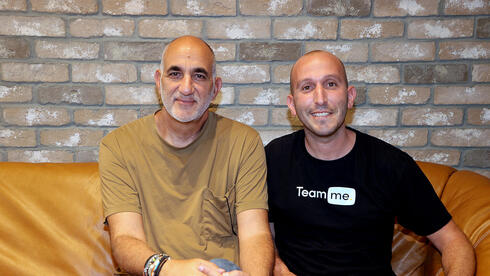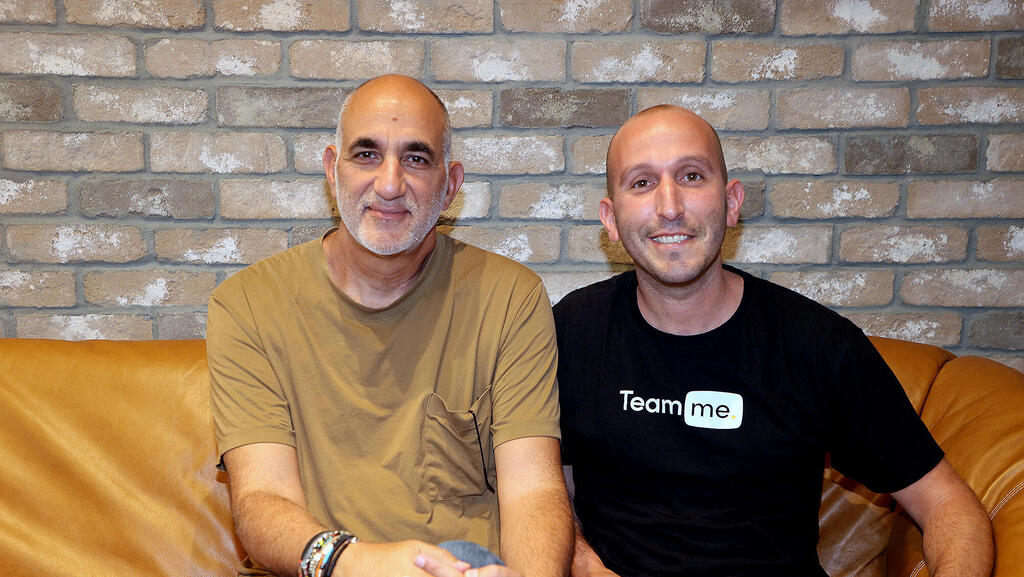
"Raising funds is an excellent experience for start-ups because it requires you to look in the mirror"
Ronni Zehavi from HiBob and Yotam Tzuker from Team Me talked about how to overcome crises and what you learn when raising money. The meeting was held as part of the Growth+ project by Calcalist and Poalim Tech, in which one-on-one counseling and mentoring sessions are held between experienced entrepreneurs and early-stage start-up companies
Ronni Zehavi, CEO and founder of HiBob, a global platform for HR management, met with Yotam Tzuker, CEO of Team Me, a video platform for recruiting employees. The conversation was held as part of the Growth+ project by Calcalist and Poalim Tech, aimed at strengthening the resilience of the high-tech industry in Israel. This initiative features a series of one-on-one meetings between experienced entrepreneurs and early-stage start-up companies, providing advice, support, and knowledge about entrepreneurship, creativity, managing start-ups, and building companies for growth.
Ronni, can you tell us about a crisis you encountered at the beginning and what you learned that can help young entrepreneurs?
"The challenge for an entrepreneur manifests every time they go to raise money. I believe raising funds is an excellent experience for start-ups because it requires you to look in the mirror and answer pointed questions. When you raise money, the most significant challenge is to articulate what problem your solution addresses, how you solve it better than others, and how you can scale it. I've gone through this several times in my career, and it's not easy because it also depends on the macroeconomic environment. Currently, it's very difficult to raise money. You need to understand investors and how they think about what they want to see now."
Yotam, what is the biggest difficulty you have encountered in the last year?
"On a national level, I think everyone has been affected by the war. Personally, I was in the reserves in the north for three months. In a start-up with only two and a half people, my absence was very significant. It was a challenging period in the last quarter of the year. For start-ups at our stage, those who get through such tough times are often the strongest, as it forces you to think twice about your actions and build resilience."
Ronni, what advice did you give on this matter?
"Yotam's choice to focus on HR Tech is excellent because few markets have changed as dramatically as this one in the last ten years, and this trend is not ending anytime soon. Up until ten years ago, the work environment was typically 9 to 5, full-time, in a single office location. The pandemic accelerated change, and now the labor market is evolving, taking at least 10 to 15 years to stabilize. Entering a changing market is always wise because it offers great opportunities for innovation. You need to ask yourself at the beginning about the potential of your venture. Can you build a real company with a solid customer base and a good product? It takes a lot of effort to raise funds and establish an organization. Alternatively, you might realize your idea is very niche, serving as a complementary feature to an existing product. Every entrepreneur must decide whether their idea has broad potential or is highly specialized."
What did you learn from each other?
Yotam: "There aren't many examples of Israeli companies that have built a SaaS product for B2B outside the cyber world. It's a great privilege to gain perspective on where the market is and how to build a company."
Ronni: "I gained a new understanding of an employee's experience as a candidate."
Tell us about something interesting or surprising you discovered about each other today.
Yotam: "I learned that Ronni has two children in the army. As a reservist, I know Ronni is also deeply involved in helping the wounded and disabled of the IDF. It's important for market leaders to have values beyond just business."
Ronni: "Yotam came with a leg injury, and I hoped it was from a skiing accident. It was, but he was also in the reserves for three months, which is very tough. I also found out that I’ve known his mother for many years."














